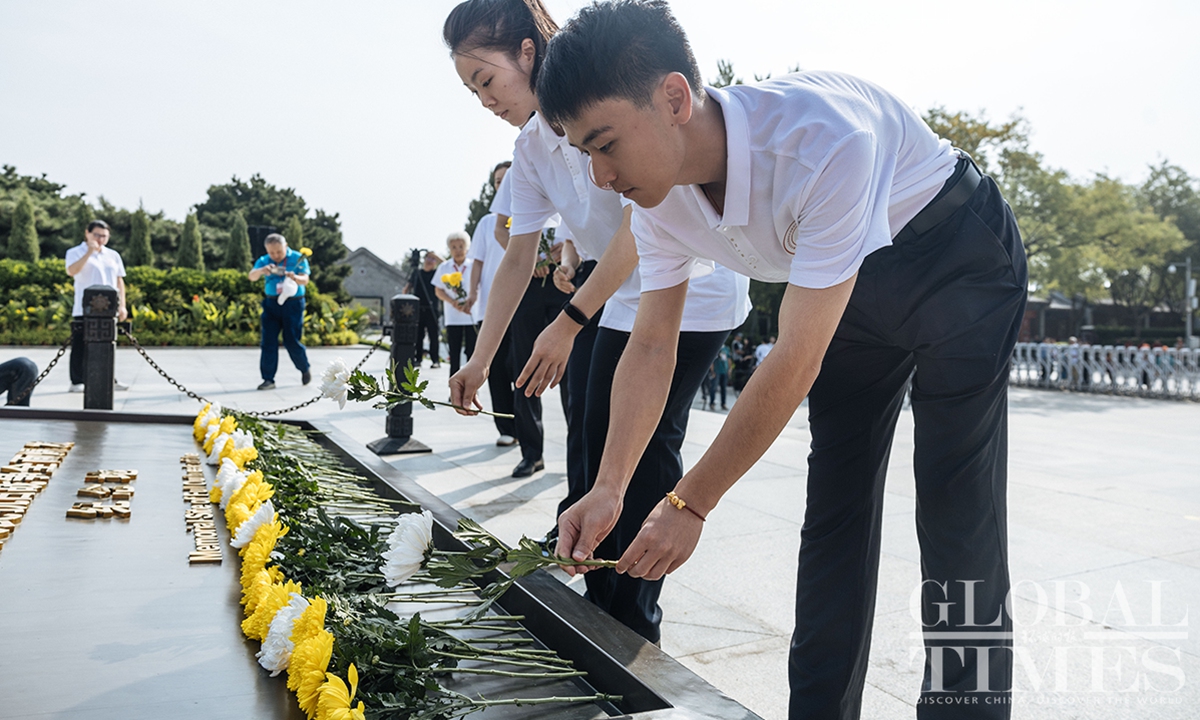Chinese people paid tribute to their fellow compatriots and the war to defend the motherland against foreign invasion on Monday, the 92nd anniversary of the September 18 Incident that marked the start of Japan's invasion of China.
On Monday morning, as a reminder for people to remember history and cherish peace, sirens howled in many major Chinese cities, including Shanghai, Shenyang, Nanjing and Chengdu, where pedestrians stood in silent tribute and vehicles honked their horns.
On September 18, 1931, Japanese troops blew up a section of railway under their control near Shenyang, Northeast China's Liaoning Province and accused Chinese troops of sabotage as a pretext for the attack. Later that night, they bombarded barracks near Shenyang. The resistance efforts of the Chinese people after the September 18 Incident signaled the beginning of the Chinese People's War of Resistance against Japanese Aggression.
Beside the sirens, many other commemoration activities were held across the country that day.
In Beijing, an activity to join hands with young people from the regions of Taiwan, Hong Kong and Macao was held at the Memorial Hall of the Chinese People's War of Resistance Against Japanese Aggression in Beijing. Beijing youth representatives recited poems with people from the three regions, who learned more about the contributions made by people in Taiwan, Hong Kong and Macao during the war.
Han Liang, a historical expert at the museum, told the Global Times on Monday that the aim of the commemoration is to get the public to remember the crimes committed by Japanese imperialism in China.
"At the same time, it serves as a reminder for the Chinese people to learn from history, and be vigilant in times of peace, as well as to strengthen their national defense awareness," Han noted.
"As a Hong Kong youth, I will always remember this period of history and constantly motivate myself to be a person useful to my motherland," Lan Chi-hei, a representative from Hong Kong, told the Global Times after participating in the commemorative event.
"I sincerely admire those martyrs, as it was their brave sacrifices that brought us the peace and prosperity we enjoy today," said Lin Chia-hsuan, another youth from the Taiwan region, after visiting Lugou Bridge.
Lin also stressed that the history of the Communist Party of China and the Chinese Kuomintang jointly resisting Japan serves as a great inspiration for today. "The Chinese nation must work together to resist external forces, so as to have a joint bright future," she said.
At the 9.18 Historical Museum in Shenyang, people from all walks of life gathered and held a ceremony to commemorate the September 18 Incident. The historical displays at the museum detail the Japanese army's long-brewing plan to invade China. About 3 kilometers from the museum lies the Beidaying site, which the Japanese troops bombarded.

Photo: Li Hao/GT
In other parts of Northeast China, Panshi in Jilin Province held a themed event to commemorate the September 18 Incident. Representatives of the descendants of the martyrs of the Northeast Resistance League and more than 500 people from all walks of life attended the event. Harbin in Heilongjiang Province also held an activity for the descendants of the martyrs on Monday.
In Fuzhou, East China's Fujian Province, representatives of the descendants of those who fought in the war lit a long fire in front of the Fuzhou Anti-Japanese Volunteers Memorial Wall together, where annual large-scale anti-war commemorative activities were held.
"September 18 is a very sensitive day for the Chinese people, one could even say it is full of humiliation," Da Zhigang, director of the Institute of Northeast Asian Studies at Heilongjiang Provincial Academy of Social Sciences, told the Global Times on Monday. "At the same time, Chinese commemorate this day every year, but not in order to perpetuate hatred."
"Japanese militarism brought great suffering to the people of Asia, including China, during World War II. However, the country's peace and history education were not thorough after the war, leading to a lot of politicians and people who have even denied this history, further hurting the Asian people," he said.
Da pointed out that for some time now, Japan has followed the US in geopolitical encirclement and containment of China, unilaterally creating obstacles to the development of China-Japan relations. The recent discharge of nuclear-contaminated water despite serious protests from China and other neighboring countries further affected relations.
While the Chinese are always learning from their collective history, they are also carrying out friendly engagement with neighboring countries, observers have noted. Positive development of China-Japan relations will depend on the efforts and sincerity of the Japanese side, while private exchanges will be the driving force behind the development of relations.




